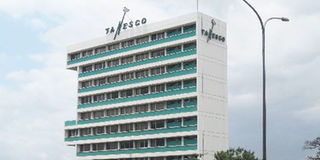Shift Sh1.4tr Tanesco debt to government, says PIC

What you need to know:
A Parliamentary Committee now wants the government to shoulder loans for the state-owned power utility firm, Tanesco, amounting to a staggering Sh1.39 trillion.
Speaking during a tour of Tanesco’s Kinyerezi plants in Dar es Salaam on Monday, the Public Investments Committee (Pic) chairman, Dr Raphael Chegeni said Tanesco’s debts were huge and a burden to it, proposing that the government should shoulder the loans’ repayments.
Dar es Salaam. The government should assume the responsibility of paying Tanesco’s debts totalling a staggering Sh1.39 trillion, a parliamentary committee has advised.
Public Investments Committee (PIC) chairman Raphael Chegeni said the debts were a “huge burden” on the cash-strapped public utility, adding that they should be transferred to the government.
“Since the government is investing in electricity generation and Tanesco is reeling under the burden, we recommend that the government assume the responsibility of paying the debts,” he said when PIC members visited the new power plant in Kinyerezi, Dar es Salaam, on Monday.
Tanesco owes its suppliers – including Independent Power Tanzania Limited (IPTL), Songas, Pan African Energy Tanzania (Paet) and Tanzania Petroleum Development Corporation (TPDC) – a total of Sh950 billion. The power firm also owes Sh442 billion in bank loans secured for operational activities.
Tanesco managing director Tito Mwinuka told committee members that the firm borrowed Sh408 billion for the purchase of heavy furnace oil for power generation, while Sh34 billion was borrowed from the TIB Development Bank for compensating people who were moved to pave the way for the construction of a natural gas pipeline to Kinyerezi.
He said the loans were secured several years ago when Tanesco was producing electricity from expensive energy sources, noting that while the company has been repaying them, the debt kept increasing when interest was factored in.
“This is why we request that government shoulder the responsibility of paying the loans, or at least help us secure a new loan because the current debt is increasing sharply due to interest,” Dr Mwinuka said.
The committee also heard that natural gas bought by Tanesco from TPDC for electricity generation is more expensive than that supplied by Paet.
Tanesco board chairman Alexander Kyaruzi said Paet could afford to sell its gas at a lower price because the government invested in the wells the resource came from.
“The story is different for TPDC, which gets gas through the Mtwara-Dar es Salaam pipeline, and therefore has to incur costs of extraction, transportation as well as repaying the loan for the pipeline,” he said.
He noted that the burden was passed on to Tanesco when it purchases gas, and advised that Treasury pay the loan currently being serviced by TPDC. “The current arrangement is not right because the loan that was secured for the construction the pipeline is essentially being paid by those using gas conveyed by the pipeline, which in this case is Tanesco and other customers.”
Dr Mwinuka said he was confident Tanesco would either break even or make a modest profit this year, thanks to a drop in operational costs brought about by the use of cheaper energy sources, including water and natural gas.
Tanesco registered Sh265 billion and Sh124 billion losses in the 2016/17 and 2017/18 financial years, respectively.




